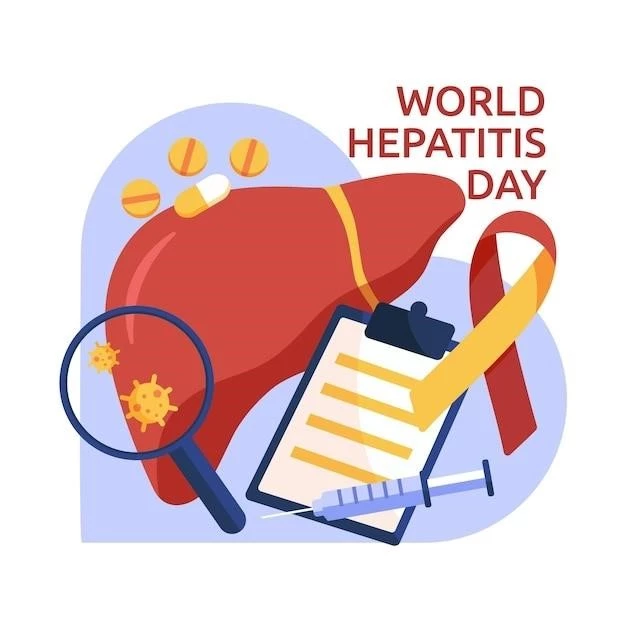Sofosbuvir is primarily used to treat chronic hepatitis C infection in adults. It is effective in reducing the amount of hepatitis C virus in the body‚ which helps the immune system fight the infection and prevent further liver damage.
Introduction to Sofosbuvir
Sofosbuvir is a prescription medication used in the treatment of hepatitis C; It belongs to a class of drugs known as direct-acting antivirals (DAAs). Sofosbuvir works by blocking the replication of the hepatitis C virus‚ leading to a reduction in viral load in the body.
It is important to note that Sofosbuvir should be used in combination with other antiviral medications for the most effective treatment of hepatitis C. Your healthcare provider will determine the best treatment regimen based on your specific condition and medical history.
Before taking Sofosbuvir‚ inform your healthcare provider about any medical conditions you have‚ especially kidney disease or liver problems. Also‚ disclose all medications‚ supplements‚ and herbal products you are currently taking to avoid potential drug interactions.
Follow your healthcare provider’s instructions carefully when taking Sofosbuvir. Do not change the dosage or stop the medication without consulting your doctor‚ as this can affect the effectiveness of the treatment.
While taking Sofosbuvir‚ it is essential to attend all scheduled appointments and lab tests as directed by your healthcare provider. These tests are necessary to monitor your liver function‚ viral load‚ and response to treatment.
If you experience any unexpected side effects or symptoms while taking Sofosbuvir‚ contact your healthcare provider immediately. Do not hesitate to seek medical attention if you have signs of an allergic reaction‚ such as rash‚ itching‚ swelling‚ dizziness‚ or difficulty breathing.
By understanding the uses and considerations of Sofosbuvir for hepatitis C treatment‚ you can work with your healthcare provider to manage your condition effectively and improve your overall health outcomes.
Uses of Sofosbuvir for Hepatitis C Treatment
Sofosbuvir is a key component in the treatment of chronic hepatitis C infection. When used in combination with other antiviral medications‚ such as ribavirin‚ peginterferon‚ or other direct-acting antivirals‚ Sofosbuvir has shown high efficacy in curing hepatitis C.
One of the primary uses of Sofosbuvir is to achieve sustained virologic response (SVR)‚ which indicates that the hepatitis C virus is undetectable in the bloodstream at least 12 weeks after completing treatment. SVR is considered a cure for hepatitis C.
Patients with hepatitis C genotypes 1‚ 2‚ 3‚ 4‚ 5‚ or 6 can benefit from treatment regimens that include Sofosbuvir. The duration of treatment and specific medications used in combination with Sofosbuvir may vary depending on the genotype of the virus and the individual patient’s medical history.
For individuals with hepatitis C‚ initiating treatment with Sofosbuvir early can help prevent complications of the infection‚ such as liver cirrhosis‚ liver cancer‚ and liver failure. It is important to follow the prescribed treatment regimen diligently to maximize the chances of achieving a cure.
It is essential for patients undergoing treatment with Sofosbuvir to maintain open communication with their healthcare provider. Discuss any concerns‚ side effects‚ or changes in your health status with your doctor to ensure the best possible treatment outcomes.
By understanding the uses of Sofosbuvir for hepatitis C treatment and actively participating in your care‚ you can work towards overcoming hepatitis C and improving your overall health and quality of life.
Side Effects of Sofosbuvir and Ribavirin Therapy
While Sofosbuvir is generally well-tolerated‚ it can cause some side effects when used in combination with ribavirin for hepatitis C treatment. Common side effects of this combination therapy may include⁚
- Fatigue⁚ Feeling tired or lacking energy is a common side effect that may improve as treatment progresses.
- Nausea⁚ Some patients may experience nausea or upset stomach during Sofosbuvir and ribavirin treatment.
- Headache⁚ Headaches are another common side effect that may occur but often improve over time.
- Anemia⁚ Ribavirin can lead to a decrease in red blood cell count‚ causing anemia. Regular blood tests are essential to monitor this side effect.
- Insomnia⁚ Difficulty sleeping or changes in sleep patterns may occur for some individuals undergoing treatment.
- Skin Reactions⁚ Skin rashes‚ itching‚ or other dermatological reactions are possible but should be reported to your healthcare provider.
It is crucial to report any side effects experienced during Sofosbuvir and ribavirin therapy to your healthcare provider promptly. Some side effects may require medical intervention or adjustments to your treatment plan.
Additionally‚ maintaining good communication with your healthcare team can help manage side effects effectively. Your doctor may recommend supportive measures or changes to your medication regimen to improve your treatment experience.
Remember to follow your prescribed treatment schedule and attend all follow-up appointments as scheduled. Monitoring your liver function and overall health throughout treatment is essential for successful hepatitis C management.
If you have any concerns about the side effects of Sofosbuvir and ribavirin therapy‚ do not hesitate to discuss them with your healthcare provider. Open communication and proactive management of side effects can contribute to a positive treatment outcome.
Interactions of Sofosbuvir with Other Drugs
As with any medication‚ Sofosbuvir can interact with other drugs‚ potentially affecting its effectiveness or increasing the risk of side effects. It is crucial to inform your healthcare provider about all medications‚ supplements‚ and herbal products you are taking before starting Sofosbuvir treatment.
Some of the medications that may interact with Sofosbuvir include⁚
- Antacids⁚ Certain antacids containing aluminum or magnesium should be taken at least 4 hours before or 4 hours after Sofosbuvir to avoid interactions.
- Rifampin⁚ This antibiotic may reduce the effectiveness of Sofosbuvir. Your healthcare provider may need to adjust your treatment plan if you are taking rifampin.
- St. John’s Wort⁚ Herbal supplements like St. John’s Wort can decrease the levels of Sofosbuvir in the body‚ potentially reducing its efficacy.
- HIV Medications⁚ Certain HIV medications‚ such as ritonavir‚ may interact with Sofosbuvir. Your doctor will need to carefully manage this combination to prevent negative effects.
It is essential to follow your healthcare provider’s guidance and closely monitor for any signs of drug interactions while taking Sofosbuvir. Report any unusual symptoms or changes in your health to your doctor promptly.
Understanding and managing drug interactions with Sofosbuvir can help ensure the effectiveness of your hepatitis C treatment regimen; By communicating openly with your healthcare team and adhering to their recommendations‚ you can optimize the benefits of Sofosbuvir therapy and improve treatment outcomes.
Dosage Forms and Strengths of Sofosbuvir
Sofosbuvir is available in oral tablet form for the treatment of hepatitis C. The dosage forms and strengths of Sofosbuvir may vary depending on the specific treatment regimen prescribed by your healthcare provider.
Common dosages and forms of Sofosbuvir include⁚
- Sofosbuvir 400 mg Tablets⁚ The standard dosage of Sofosbuvir for hepatitis C treatment is a 400 mg tablet taken orally once a day. This dosage form is commonly used in combination with other antiviral medications.
- Fixed-Dose Combination Tablets⁚ Some medications combine Sofosbuvir with other antivirals in fixed-dose combination tablets‚ simplifying the treatment regimen for patients.
- Pediatric Formulations⁚ There are specific pediatric formulations of Sofosbuvir available for children with hepatitis C‚ with dosages adjusted based on the child’s age and weight.
It is essential to follow your healthcare provider’s instructions regarding the dosage‚ frequency‚ and duration of Sofosbuvir treatment. Do not alter the prescribed dosage or treatment schedule without consulting your doctor.
When taking Sofosbuvir‚ swallow the tablets whole with water and do not crush or chew them. If you have difficulty swallowing tablets‚ discuss alternative administration methods with your healthcare provider.
Store Sofosbuvir tablets at room temperature away from moisture and heat. Keep the medication out of reach of children and pets‚ and properly dispose of any unused or expired tablets as directed.
By understanding the dosage forms and strengths of Sofosbuvir and following your prescribed treatment plan diligently‚ you can optimize the effectiveness of hepatitis C treatment and work towards achieving a cure for the infection.
Antiviral Combinations Including Sofosbuvir

Sofosbuvir is often used in combination with other antiviral medications to enhance the effectiveness of hepatitis C treatment. These antiviral combinations are tailored to individual patients based on factors such as hepatitis C genotype‚ medical history‚ and previous treatment experiences.
Common antiviral combinations including Sofosbuvir may include⁚
- Sofosbuvir and Ledipasvir⁚ This combination is known as Harvoni and is used to treat hepatitis C genotypes 1‚ 4‚ 5‚ and 6. It is often prescribed for patients with or without cirrhosis.
- Sofosbuvir and Velpatasvir⁚ Marketed as Epclusa‚ this combination is effective against all six major hepatitis C genotypes and is suitable for patients with or without cirrhosis.
- Sofosbuvir and Daclatasvir⁚ This combination is used to treat hepatitis C genotypes 3 and is effective for patients with or without cirrhosis.
When combining Sofosbuvir with other antiviral medications‚ it is essential to follow your healthcare provider’s instructions carefully and adhere to the prescribed treatment regimen. This helps maximize the chances of achieving a sustained virologic response (SVR) and potentially curing hepatitis C.
Patients undergoing antiviral combinations including Sofosbuvir should attend all follow-up appointments and laboratory tests as scheduled. These evaluations are essential for monitoring treatment response‚ liver function‚ and potential side effects.
If you have any concerns or experience unexpected side effects while on antiviral combinations with Sofosbuvir‚ do not hesitate to contact your healthcare provider. Prompt communication and proactive management of any issues can help optimize your hepatitis C treatment outcomes.
By working closely with your healthcare team and following the prescribed antiviral combinations including Sofosbuvir‚ you can take a significant step towards achieving a successful outcome in your hepatitis C treatment journey.
Health Care Data Analysis on Drug Interactions
Healthcare providers rely on data analysis to assess potential drug interactions when prescribing Sofosbuvir for hepatitis C treatment. Utilizing health information technology and clinical data helps identify interactions that could impact patient safety and treatment outcomes.
Key aspects of health care data analysis on drug interactions with Sofosbuvir include⁚
- Electronic Health Records (EHR)⁚ EHR systems compile patient data‚ including current medications‚ allergies‚ and medical history‚ to flag potential interactions with Sofosbuvir. Healthcare teams use this information to make informed treatment decisions.
- Drug Interaction Databases⁚ Providers access comprehensive drug interaction databases to check for interactions between Sofosbuvir and other medications. These databases provide real-time alerts and recommendations for managing potential interactions.
- Clinical Decision Support Systems (CDSS)⁚ CDSS integrated into electronic prescribing systems offer clinicians evidence-based guidance on selecting safe medication regimens that avoid harmful interactions with Sofosbuvir.
- Pharmacogenomic Data⁚ Genetic information can influence drug metabolism and response to therapy. Pharmacogenomic analysis helps identify patients at risk for adverse drug interactions with Sofosbuvir based on their genetic profiles.
- Adverse Event Monitoring⁚ Health care data analysis includes monitoring and reporting adverse events associated with Sofosbuvir and other medications. This data guides healthcare providers in adjusting treatment plans and managing side effects effectively;
By leveraging health care data analysis tools and resources‚ healthcare professionals can proactively identify and mitigate potential drug interactions that could compromise patient safety or treatment efficacy. Collaborative efforts between clinicians‚ pharmacists‚ and technology systems are essential in ensuring optimal care for individuals undergoing Sofosbuvir treatment.
Patients should actively participate in discussions about their medication history and raise any concerns about possible interactions with Sofosbuvir. Open communication with healthcare providers enhances the accuracy of health care data analysis and promotes personalized treatment strategies tailored to individual needs.
Through ongoing data analysis and continuous monitoring‚ healthcare teams can optimize the use of Sofosbuvir and other medications in hepatitis C treatment‚ ultimately improving patient outcomes and quality of care.
